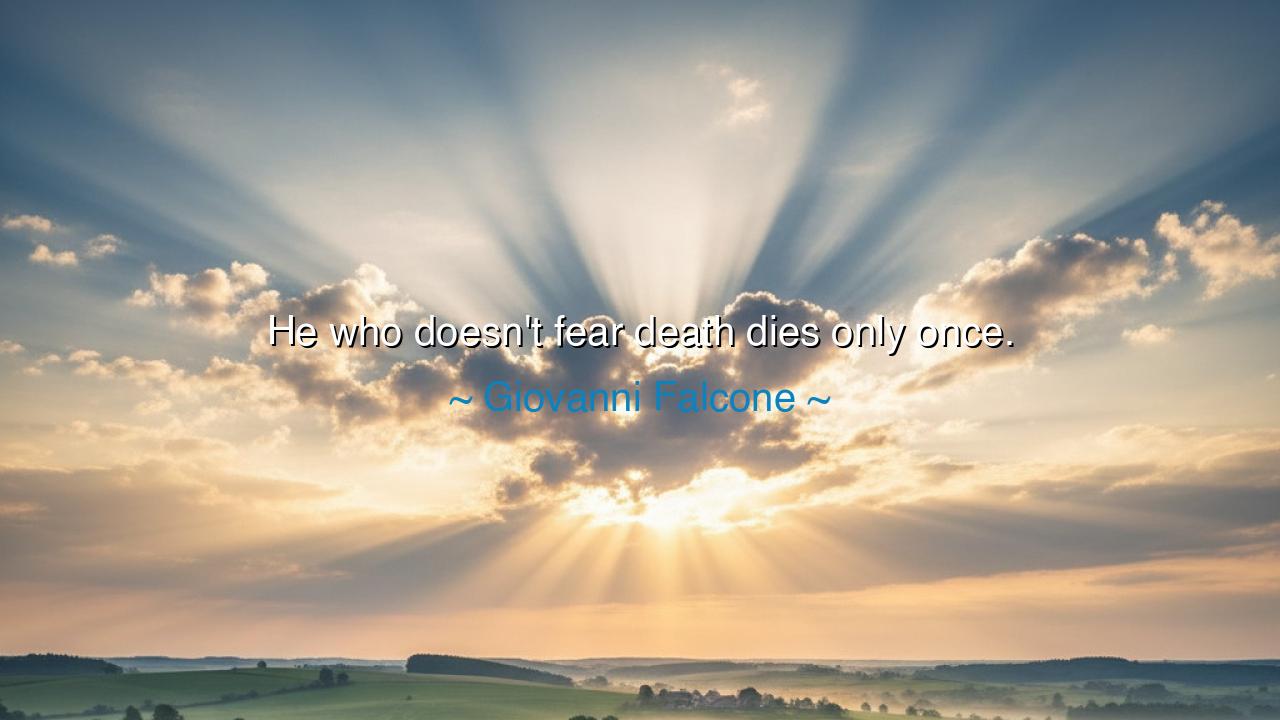
He who doesn't fear death dies only once.






“He who doesn’t fear death dies only once.” Thus spoke Giovanni Falcone, the Italian judge and martyr of justice, who walked unflinching into the storm of violence and corruption that consumed his country. His words were not poetry, but conviction—spoken by a man who faced death each day and met it with calm defiance. In this single sentence, he gives us a truth as sharp as the sword and as ancient as courage itself: that fear, not death, is the true destroyer of life. The man who fears death dies many times in his imagination; the one who conquers that fear lives fully—and when death comes, he dies but once, as all mortals must.
Falcone’s life was forged in the fires of Sicily’s darkest days, when the Mafia reigned through terror and silence. As a prosecutor, he devoted his life to unraveling their power, knowing each case drew the noose tighter around his own neck. Friends warned him. Enemies threatened him. Yet he continued, saying, “Courage is not the absence of fear, but the mastery of it.” He lived each day aware that his death was near, yet this awareness did not imprison him—it liberated him. For to see death clearly, and not turn away, is to free oneself from its tyranny. In this spirit he declared, “He who doesn’t fear death dies only once.” When assassins finally struck him down in 1992, his body perished, but his courage became immortal.
This idea—that fear kills us before death ever can—runs deep through the history of wisdom. The Stoic philosophers taught that we should meditate daily on mortality, not to despair, but to live with clarity. “It is not death that a man should fear,” wrote Marcus Aurelius, “but he should fear never beginning to live.” For the one who trembles at the thought of death becomes its prisoner long before it arrives. He lives in half-light, guarding himself from risk, from love, from purpose. But the one who accepts death as part of the natural order walks as a free soul, unbound by the illusions of permanence. Falcone’s words breathe the same timeless truth that has echoed through the ages: only the fearless are truly alive.
Consider the story of Socrates, who, sentenced to death by poison, spoke calmly to his disciples as they wept around him. “No evil can happen to a good man,” he said, “either in life or after death.” His serenity did not come from ignorance, but from understanding: that death is but a doorway, and fear of it only clouds the spirit. Socrates, like Falcone, knew that a man’s worth is not measured by the length of his days, but by the integrity with which he faces their end. Both men met death not as cowards fleeing its shadow, but as sages who had already conquered it in life.
There is power in this way of seeing. When we cease to fear death, life itself becomes radiant. Every act, every word, every breath grows precious. The petty anxieties that bind us—the fear of failure, of ridicule, of loss—fall away, for they are all shadows of the greater fear. To live without fearing death is to live with the strength of lions and the peace of saints. It is to walk in the sunlight of truth, knowing that death is not an interruption of life, but its completion—the punctuation mark that gives the sentence meaning.
Falcone’s words do not glorify death, but sanctify life. He does not tell us to seek danger, but to live so nobly that when danger finds us, we are unafraid. For every human being must die—but not every human being truly lives. To live in fear is to surrender your days to a phantom that has not yet touched you; to live in courage is to claim every heartbeat as your own. The one who fears death dies a thousand tiny deaths, shrinking each time he hesitates; the one who faces it dies only once, and in that single moment, his spirit rises eternal.
The lesson, then, is this: fear is the enemy of life, not death. Each day you live in fear, you betray the gift of existence. Cast off the illusion of control, for death will come as it will. Instead, honor the hours you have—speak truth even when it costs you, love even when it hurts you, and act even when the outcome is uncertain. If you can meet life with such courage, then death will not frighten you. It will find you standing tall, with your work complete and your soul at peace.
And when that final hour comes—as it comes for all—you will not meet it as a stranger, but as an old friend whose steps you have long heard approaching. You will look upon it with calm eyes and know, as Falcone knew, that you have died but once—because you have lived without fear. For only those who fear death truly die before their time; the rest live as immortals in the hearts of those they leave behind.






AAdministratorAdministrator
Welcome, honored guests. Please leave a comment, we will respond soon